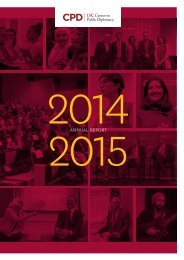Create successful ePaper yourself
Turn your PDF publications into a flip-book with our unique Google optimized e-Paper software.
PUBLIC DIPLOMACY IN SUB-SAHARAN <strong>AFRICA</strong><br />
27<br />
A DISCUSSION ABOUT THE EVOLVING ROLE OF<br />
GASTRODIPLOMACY IN <strong>AFRICA</strong>N CUISINE<br />
GASTRO -<br />
DIPLOMACY<br />
IN <strong>AFRICA</strong><br />
AN INTERVIEW WITH WILBERT JONES<br />
Jung-Hwa Kang & Erica McNamara<br />
WINTER 2016 | @PD_Mag<br />
PRESIDENT OF THE WILBERT JONES COMPANY,<br />
A GOODS AND BEVERAGE PRODUCT DEVELOPMENT<br />
AND MARKETING BUSINESS, FOUNDED IN 1993<br />
Wilbert Jones is the President of The Wilbert<br />
Jones Company, a goods and beverage<br />
product development and marketing<br />
business, founded in 1993. Jones was<br />
formerly a food scientist at Kraft Foods'<br />
biotechnology department from 1985-<br />
1993. He received a B.S. in chemistry from<br />
Loyola University of Chicago and studied<br />
at the Ecole de Gastronomic Francasie<br />
Ritz-Escoffier in Paris, France. Jones is the<br />
author of several cookbooks and in 2015<br />
published, Images of America: Chicago Blues.<br />
Public Diplomacy Magazine editors Jung-<br />
Hwa Kang and Erica McNamara interviewed<br />
Mr. Jones to discuss the evolving role of<br />
gastrodiplomacy in African cuisine.<br />
You have been doing a lot of<br />
lectures, seminars, and teaching<br />
particularly on African cuisine.<br />
How do you differentiate your<br />
teaching style from the way that<br />
you were educated? Do you focus<br />
more on culture or teaching the<br />
technique?<br />
Wilbert Jones: When I do my lectures and<br />
seminars with students and faculty, I like to<br />
meet them where they are. What I mean by<br />
that is that, of course they are in a structured<br />
academic environment, but if I am going to<br />
Kendall College (Chicago, IL) to teach, most<br />
of my class is basically just feeding them,<br />
seeing where their heads are, and asking<br />
them questions such as where were you<br />
born? Where were you raised? What inspired<br />
you to cook? Did you learn to do things from<br />
your grandmother? Why do you really want<br />
to be a chef? And it is amazing, because I<br />
think this transformation comes when you<br />
get 30-40 people in the room and you have<br />
that approach. If I am talking about a region<br />
in Africa that they are not familiar with or<br />
either a certain kind of ingredient, then I<br />
will bring that ingredient to start talking<br />
to each of the students based on their<br />
history: whether they are from Louisiana or<br />
upstate of New York. From that angle, the<br />
students would start really feeling that they<br />
are thinking out of the box. I think this is<br />
very good approach to take because then<br />
everyone has something to contribute.<br />
What type of food culture have you<br />
seen in Africa?<br />
WJ: Well, it depends again on your<br />
connection. Are you Muslim? Sitting down<br />
with your family? Is it a feast? Will there<br />
be several dishes? If you are urban, such as<br />
in Dakar, Senegal, you are probably eating<br />
the way we do in America: breakfast, lunch,<br />
and dinner. You are eating on the run or<br />
you might go out to dinner and have a few<br />
courses here and there, so it just depends<br />
on your background. If you go more into the<br />
rural pockets, you might have just two meals<br />
a day: you have something in the morning<br />
and something later in the day. There<br />
CULTURE PUBLIC-PRIVATE GOVERNMENT<br />
WINTER 2016 | @PD_Mag<br />
28



